Sylvester Stallone On ‘Rocky’, ‘Creed’ & The 40-Year Career In Between – Q&A
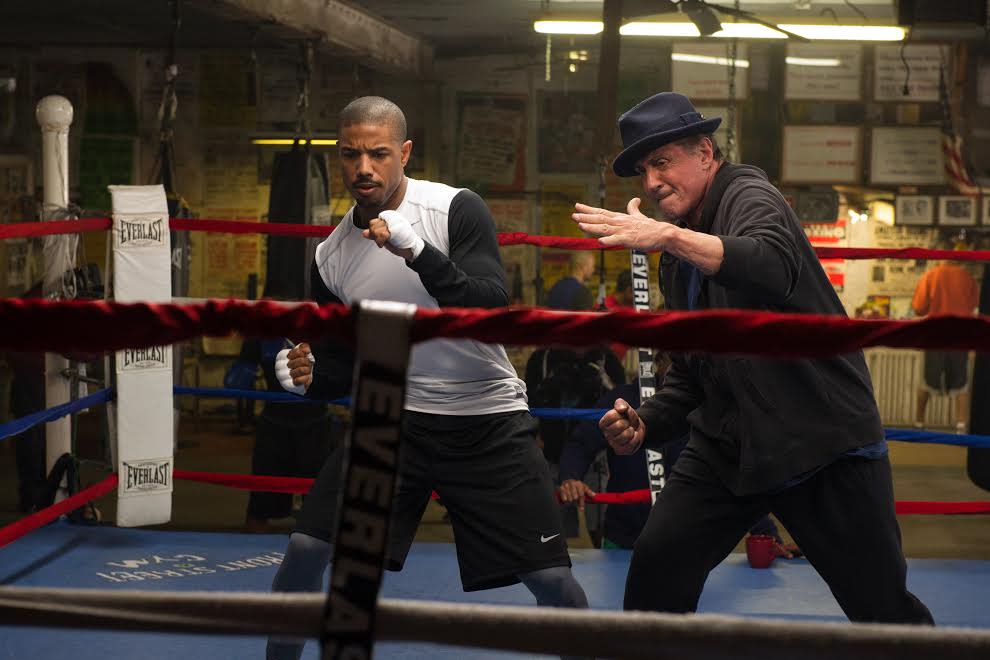
It has been 40 years since Sylvester Stallone personified the Hollywood dream, that any unknown with talent and determination could write his ticket to stardom. He did that with Rocky, the underdog story that received 10 Academy Award nominations and won three awards including Best Picture, over films like All The President’s Men, Network and Taxi Driver. Stallone received his only career Oscar nominations for writing and starring in the film that launched his star. There is plenty of momentum for him to make history and get nominated for the same character, four decades later. In Creed, Stallone fits squarely into the Best Supporting Actor discussion. His Rocky Balboa doesn’t really throw a meaningful punch in the ring, but faces his most dangerous opponent in a potentially fatal disease. This, after the young progeny of his former nemesis-turned best friend Apollo Creed gives Balboa a reason to do more than wait to die. Stallone’s subdued performance already has won a slew of critics awards–director Ryan Coogler presents him with the National Board of Review prize in New York this Tuesday–and he is nominated for a Golden Globe. As Creed crosses $100 million in domestic box office and Rocky hits 40, Stallone looks back on a most unlikely career with all its twists and turns.
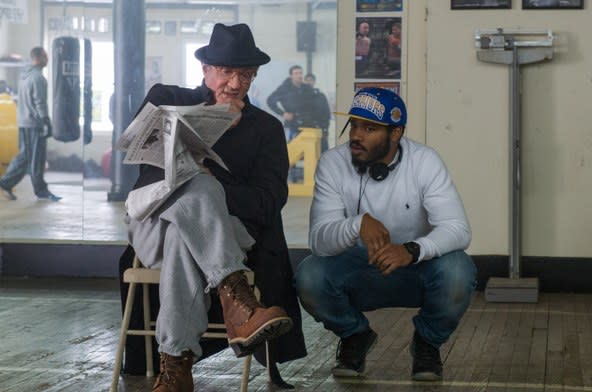
DEADLINE: You have always been a hands on filmmaker, and Rocky is your greatest creation. Ryan Coogler hadn’t shot a frame of Fruitvale Station when he first asked you not only to entrust him with your franchise, but also to give Rocky Balboa a potentially fatally disease. How did this unproven filmmaker win your trust, and how long did that take?
STALLONE: It took him about two years to convince me. I had been very, very grateful the way last chapter of Rocky Balboa wrapped up his story in a satisfactory way for the audience. When Rocky waves goodbye, that was a goodbye to the audience and a thank you. I just thought, “Finally,” and thought it was a wonderful send-off. Rocky stayed dormant for six or seven years, and then this fellow comes in, and says, “Oh, can we dig him up?” I go, “No, no, no, no.” Then he proceeded to tell me this story. My first reaction was it was disconcerting. It shows Rocky outside the ring, fighting the fight that he really can’t win. It’s a fight against the greatest opponent in the world; life. I said, “No, kid, I think we’re tampering with something here we should leave alone.”
DEADLINE: What happened?
STALLONE: So he goes away and does Fruitvale Station. Wins all these awards, and he’s offered multiple job opportunities and he keeps coming back to Creed. I see this and say, this fellow here obviously is functioning on a different kind of energy. It is heartfelt, not monetary, not ego. It’s as though he has to finish a mission, which was a love letter to his father who had been very, very ill and that stimulated the idea. There was just something about this kid, who was very, very physical in his manner, but sensitive and emotional. It kind of reminded me…of me, truth be told. So I finally said, “You know what? Someone took a chance on me, once. I’m just going to throw caution to the wind and let him run with it.”
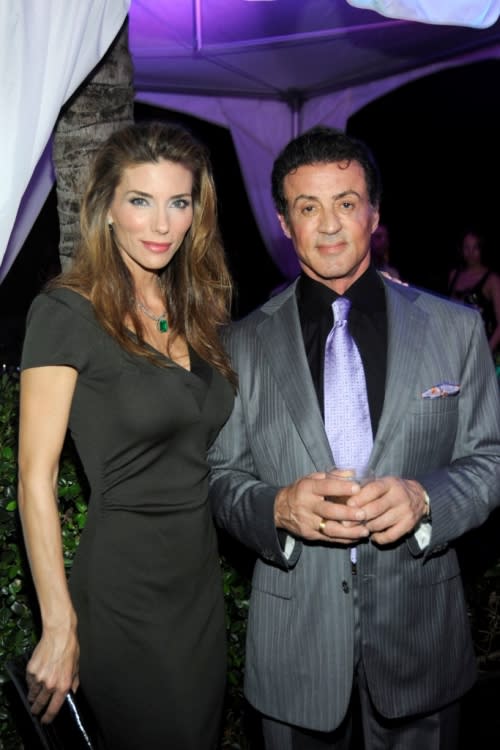
DEADLINE: Your agents begged you to do Creed, but I heard your wife Jennifer served an important role in persuading you. How did that conversation go?
STALLONE: I said to my wife, “Maybe I can rewrite the story to where Rocky’s neighbor is sick, and Rocky helps take care of his neighbor. Or maybe Paulie is battling disease, and I can take his…” She stopped me and she says, “No, no, no, no, that’s the whole point. If you really do want to go someplace that you haven’t gone maybe ever, then test yourself and see what you’re made of. This is it. This is what people go through, every day. This is not about vanity. This is not about masculinity. It’s just about the soul, and you’re a coward if you don’t do it, or if you find a cowardly way to do it.” I went, “Wow.” That was a first; I’m not normally called that. But it was true. You’re afraid to tackle something like that, but I guess the responsibility of an actor is to sometimes go someplace that is uncomfortable but also is representative of life. I hadn’t done that since Cop Land.
DEADLINE: That crystallized it?
STALLONE: Well, they all sort of shamed me sort of into it. And then, once I committed to it, it was very cathartic. It was wonderful to just relinquish the reins to this very, very confident and committed young man who was two generations removed. You know, this fellow wasn’t born until Rocky IV. There’s this old saying, “youth must be served.” If I had directed this, I don’t think it would have been nearly this good, or close to being this inventive. He’s just got a different generational touch but he still paid respect to his elders.
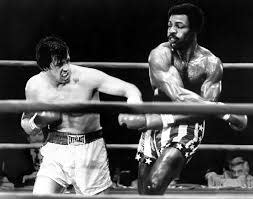
DEADLINE: You mentioned that someone took a chance on you. Next year is the 40th anniversary of Rocky. The fun part of covering this business is that everybody has a puncher’s chance and enough long shots pay off to make you believe anything is possible. We’ve had Ben Affleck and Matt Damon discuss holding onto their Good Will Hunting script until it was made on their terms, but you are the ultimate example of the puncher’s chance connecting. If you don’t mind looking back, you had graduated from bit parts to The Lords of Flatbush and Death Race 2000, and then you wrote yourself this career role, only to be asked to cash a big check and defer to an established star. How long did it take you to write Rocky, and was it one of many that you had sitting in a drawer?
STALLONE: I started writing around 1969, when I realized the acting wasn’t materializing. My first screenplay was basically a what I did last summer kind of story. Then in 1971, I wrote a screenplay about Edgar Allan Poe, and that got me writing about people other than myself. Then I wrote Paradise Alley because I wasn’t getting any acting jobs. I went up to an audition… actually someone was doing me a favor and I went in to meet Irwin Winkler and Bob Chartoff, and they really had nothing for me to do. I’m there, they are being courteous but I had the feeling they were looking at their watch and saying, “Thank you for coming by. We’ll keep you in mind,” and I went, “Okay.” And I said, “By the way, I write a little bit.” They go, “Sure, okay. If you ever find anything…” Well, I didn’t have anything that was really applicable. I had this screenplay called Paradise Alley, but I h already sold the rights for that. For a hundred dollars.
DEADLINE: A hundred dollars?
STALLONE: A hundred dollars. I know. But anyway, I started thinking about how every role I’d get, I’m always kind of the street guy or the thug or the mugger. I did that with Woody Allen, and with Jack Lemmon in The Prisoner of Second Avenue. Then Lords of Flatbush. I thought, why don’t I just write a story about a guy like that, but he has a good heart. And then this Chuck Wepner fight [against Muhammad Ali] came on, and I thought of Rocky Marciano and how he was physically in the same ballpark as me. This character wasn’t that smart, but he had heart. A lot of heart. Man, I just started writing and writing and writing and writing, and I came up with this idea in about three and a half days. Ninety percent of it was not good, but at least it had a beginning and a middle. I had something to work on.
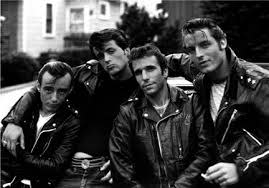
DEADLINE
: A work in progress?
STALLONE: I brought that back to show them. I don’t know if they were just being polite, but they said, “Oh yeah, keep working on it.” So I came back two weeks later with another draft. They said, “Well, let’s try this angle or that angle.” After about 20 different incarnations, they said, “We’d like to make this movie.” Which left me in complete shock, because I had nothing at this point.
DEADLINE: They agreed to make it then, with you as star?
STALLONE: This was before that conversation. Irwin Winkler and Bob Chartoff, they took a lot of heat, and they were being embarrassed by United Artists and were being told, “Why would you waste your time on this? We’re not going to put a dime into it.” Those guys actually mortgaged their homes, I don’t know if people knew that. They put up their own personal savings, and they weren’t incredibly rich at that time. It was a big leap of faith. So it was a Rocky story on all different levels. I have to give them credit because I certainly couldn’t have ever done it alone, and maybe I realize this more at age 69, but we really did it as a team. You can’t do these things, alone.
DEADLINE: We just interviewed Burt Reynolds for his memoir and he said he very much wanted to play Rocky. He was a huge star at the time…
STALLONE: He would have done well with it, but you know…I just…couldn’t. You’re right, though. At that time, it was the apex of very physical actors. You had Ryan O’Neal, who loved boxing. I saw him spar with Joe Frazier once when I was doing extra work in 1971. I said, “Wow, look at that,” and then you had Burt Reynolds who was a real good college football player. Another tough guy, Jimmy Caan, liked it and you had Nick Nolte. All these guys were the prime suspects to play the character, and they’d all probably have done it very well. It was a miracle that it happened the way it did.
DEADLINE: Reports had you being offered as much as $350,000 to step aside. How much would that have meant to your life?
STALLONE: I was pretty flat broke at that time, and really, I had nothing left. My cost 40 dollars, and I had to sell my dog because I couldn’t afford the dog food.

DEADLINE: You sold your dog?
STALLONE: Yeah, I had to sell my dog. At a 7-11. For 50 bucks. Then, when the movie happened, I tried to buy him back. The guy goes, “Well, I want 1500.” I went, “Oh my God.” He ended up being in the movie, Butkus. I figured, that poor dog had suffered with me in New York for five years. He deserved to be in the movie.
DEADLINE: That is real hardship. What kept you from caving?
STALLONE: I don’t know, but I thought, you hit about five or six major crossroads in your life. That was just an unconscious thought because I wasn’t smart enough then to have actually figured out life. I just knew that if I was ever going to have an opportunity, this was it. I had studied Marty Scorsese’s Mean Streets, and On the Waterfront. I understood this character. I had worked on those docks when I was, from 16 to like 17 and a half when I was in and out of school. I eventually went back to high school, but for a year, I worked for that area. So I understood it. You know, it is just one of those nice things that happen once in a while, where you just put everything on one roll of the dice and hope it works. I wasn’t confident it was going to work at all.
DEADLINE: Why not?
STALLONE: Well, you have hope. But I had to be realistic. It was a very little film, 25-day shoot, under a million bucks. John Avildsen was so brave, and Bill Conti wrote a score that was just so unexpected and so noble. That was the thing about Rocky, there were so many incredible elements that just came together. Garrett Brown had just invented the Steadicam, and it just happened that he lived in Philadelphia. So all these incredible runs up and down those steps and I think some people weren’t aware, but they felt, something was different. How is somebody running at the same speed as Rocky, without the camera jumping up and down? What I’m saying is that so many minor movie miracles happened, and I happened to get pulled along with it.
DEADLINE: All this leads to the Academy Award and suddenly, your poster is on bedroom walls all over the country. Describe how life changed after Rocky won Best Picture, and what it was like to be courted by people who wouldn’t give you the time of day?
STALLONE: It was overwhelming, and I don’t think I was mature enough at this time to really understand and fully enjoy the moment. I tell young actors, please, really focus on this moment. Take a mental picture of it, and keep that film in your mind because it comes maybe once in your lifetime. I wished I had savored it more, but I think I just didn’t understand what was happening. I wish I had been more grateful. Now, at my age, I realize how almost impossible that success was. I wished I could go back, and savor it. Right now, I am doing that, benefitting from the dedication and brilliance of this young director and what he has done with Creed.
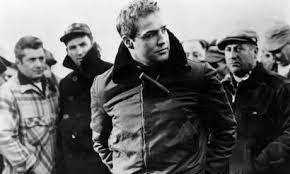
DEADLINE: When it happened the first time, was there a career you wanted to emulate, and did you see a path toward being an action star?
STALLONE: No, I didn’t even know what an actor was in the sense. I liked movies with historical mythologies, like Spartacus, sorcerer movies like Sinbad and I would Viking, I was drawn towards those even sort of the sorcerer movies, like Sinbad, and I would look at films with Brando and James Dean, and I could relate to them even though they were a little older than me. I thought about kind of dramatic career, and so I followed up with F.I.S.T., which Norman Jewison did a great job on. And then things happened that I didn’t expect. I directed my first film, Paradise Alley, and while it didn’t do very well, I found I really loved the process of directing. And then, someone presented me this First Blood screenplay. I was maybe the 11th choice and it had been passed over by all these directors, but I saw it as a dramatic action movie. Minimal dialogue, very cinematic, story told through the director’s eye. Nobody wanted it, we couldn’t get a distributor for a year until finally some independent company picked it up and TriStar put it out. It did okay, and they said, you want to do a second one? The stars aligned for me, again. I think it was the 10th anniversary of pulling out of Vietnam. There was a lot of publicity, and Rambo just landed in the right spot, and the next thing I know, I am in this different kind of world, this action world. And I just stayed in it for a little too long.
DEADLINE: A little too long?
STALLONE: Yes. It’s more important to know when to leave the party than when to show up.
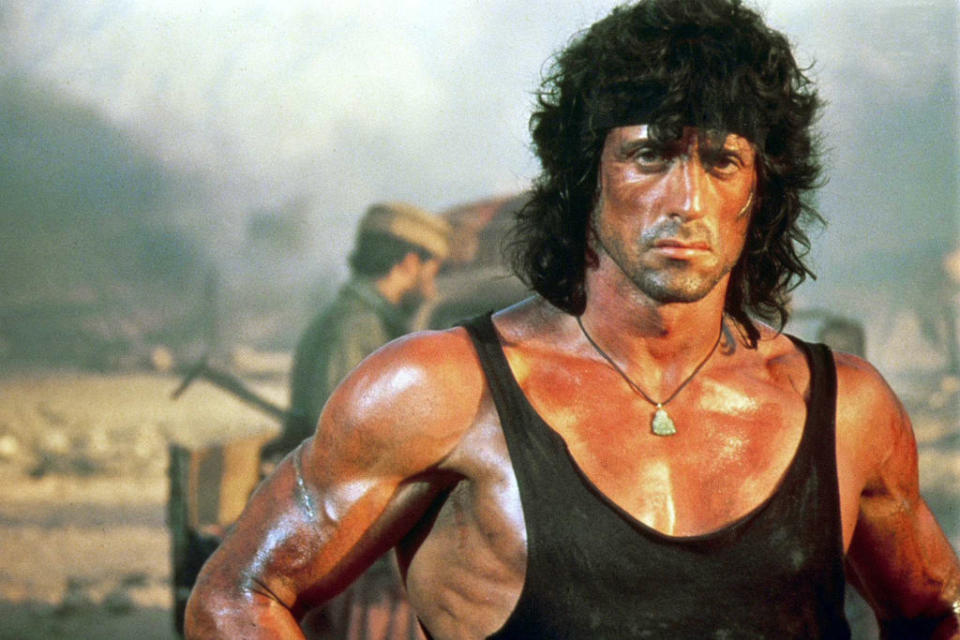
DEADLINE: First Blood, and then Rambo caught the zeitgeist in a way reminiscent of American Sniper, another movie where even the studio was surprised how it caught on. Why do you think that First Blood and Rambo connected so strongly?
STALLONE: I was lucky enough to come along at a time when there was an opportunity, a vacancy for that kind of hero. Every generation redefines the kind of heroes it chooses to celebrate. Today, it’s mainly these fantastic heroes like Spiderman, Ironman, Avengers. Back in the 50s and 60s, it was mainly through the westerns. Then there was this valley. Burt Reynolds was doing mainly comedy and car films. So there was an opening for this isolated human being, the loner who puts honor first. I wasn’t even aware of it, but when I go back and think about it, a lot of people that could identify with being isolated or ostracized or unappreciated by either their families or their government. They chose to use this symbolically and I think Rambo became more of a symbol than an actual real person. Both films had one foot in reality, and there were POWs, returning Vets, Afghanistan, Burma, and we blurred those lines and somehow he became a character for the 80s and the early 90s. I don’t know if it would translate today but that character was a throwback, a reinterpretation of heroes of a certain time. When I was a kid, it was Steve Reeves and Hercules, and the Westerns and gangster movies. And then it became the lonely vet.
DEADLINE: What gave you the courage to direct Rocky II, when Avildsen did such a great job on the first one?
STALLONE: I didn’t want to do it; John did a great job and won an Oscar. What had happened is, he didn’t quite agree with the subject matter on the second one and just said, “I don’t want to do it.” Then the producers said, “Why don’t you direct it?” I said, “Excuse me?” That was the adventurousness of Irwin Winkler and Bob Chartoff. “You wrote it, you understand it. Why not direct it.” They gave me the nerve to do it. Paradise Alley hadn’t come out yet. I started directing Rocky II and decided to work backwards, doing the fight first. So I’m directing that and we move to Philadelphia, and I’m nervous because, how can I come close to Rocky, as a director, but I’m trying. Paradise Alley comes out, and I go to see it during lunch and there are four people in the theater. Four. In Philadelphia, of all places. I went “Oh my God.” I had to go back to the set. It didn’t work out that badly for Paradise Alley, but my confidence was at an all-time low that day, and I had to tell myself, just keep punching.
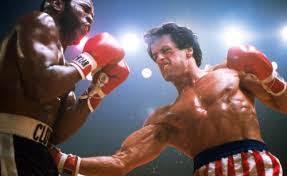
DEADLINE: You got progressively more muscular and defined in that second and third film. We see guys like Michael B. Jordan and Jake Gyllenhaal get in ring shape, and return to normal. You seem to have maintained that form for years.
STALLONE: Yeah, and it’s very hard. Actually, it’s the third one, which dealt with Rocky losing of the Eye of the Tiger and becoming vain and insulated and all about his commercial-ity. He became a brand rather than a fighter, and had to rediscover who he was. To me it’s like when actors or anyone start to become more interested in their appearance than the actual product. It took about a year to get into that shape, and I wouldn’t recommend it because maintaining that for so long actually can do physical harm to the kidneys. It causes anxiety because you’re not getting enough nutrients. You are actually depleting yourself. The look was required for that movie, and that’s when the action film thing took off. First Blood came out around the time of Rocky III. I remember doing First Blood during the day and editing Rocky III at night. So I got into this physical acting, and then it became ingrained in me, a lifestyle. Constantly working out and increasing your goals, physically, so you can do Cliffhanger and Demolition Man.
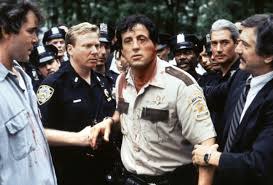
DEADLINE: Seems like it would be great to be incentivized to not get fat. Was there a moment where you got carried away and had to dial it back?
STALLONE: It came right before Cop Land. I had pushed a little too far and had an erratic heartbeat. So I said, maybe I should do a film that I can have pancakes and French Toast every morning and not stay on a treadmill for hours a day. That was Cop Land. I had a great time working with Jim Mangold, De Niro and Keitel, and Ray Liotta. This was such a blessing, and I enjoyed it so much. If I could have stayed there, I would have. I loved doing ensemble work with Mangold and Harvey Weinstein really made a solid film. Creed has left me with the same good feeling.
DEADLINE: All that time you and Arnold Schwarzenegger were the biggest global action stars, and you with three franchises in Rocky, Rambo and The Expendables. And yet, I get the feeling here that it held you back from the kind of respect you are now getting for your work in Creed. Maybe you couldn’t get certain roles, or veer from how you felt your audience wanted to see you. Did your action star standing marginalize you?
STALLONE: Absolutely. I think that there’s a preconceived notion that an action film is a mindless exercise in visual dexterity. Quite often, they’re right. But when you do it in a proper way, say like The Bourne Identity, it’s really intriguing, isn’t it? You’re able to combine all the different skillsets, acting, visual, and the kinetic energy. But it doesn’t happen very often, and when you hear the word, “Action,” you say, “Okay, the guy really can’t act; all he can do is be very, very physical,” In a sense you are considered more of an empty vessel. I get that just comes with the territory, and that if you stick around too long, it becomes kind of your epithet.
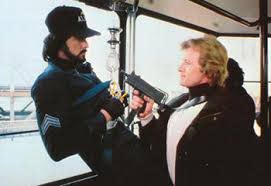
DEADLINE: I thought Nighthawks was one of those elevated action films, a taut underrated thriller…
STALLONE: Yeah, I remember Nighthawks. Again, a film that didn’t find an audience, but I thought Rutger Hauer was incredible. Maybe it was that urban terrorism wasn’t perceived as a serious threat then, and they said, “Well, this so far-fetched,” but I liked that film a lot.
DEADLINE: It would be relevant today.
STALLONE: That was a tough movie. We shot nights, like 40 in a row. The shoot lived up to its title.
DEADLINE: What movies weren’t available to you because of how you were marginalized that left you shaking your head?
STALLONE: Oh, I guess it was around 2000, when things were not flowing very well. I would see these great roles, for example, Man on Fire, which would be a combination of acting and drama. Denzel did a great job on that one. Or Collateral, where you see this fusion between action and drama, and melodrama, but where you’re not completely abandoning one genre for another, you are just bringing them all together. Heat was another like that. I would have loved to have been in all of these films.
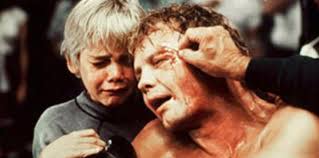
DEADLINE: You mention these actors like Denzel and De Niro who have been able to move back and forth between drama and action. Both of them, and Will Smith, Russell Crowe, Jake Gyllenhaal and a lot of others have played boxers. You wrote the book on great fight choreographer. Which actors wowed you most, and why?
STALLONE: The hardest part of doing a fight films is, it’s like you’re making two films. One is a dramatic film, and then you have to do this action movie which is a whole other style and directorial vocabulary. So the dramatic part can be very good but the boxing can be overdone or underdone. When I think back, I think of Jon Voight. I think he did well in The Champ. A lot of people never mention that, but he had excellent footwork, fantastic jabs, and he was in there against Randall Cobb, who was a professional fighter. I thought it looked really, really good. I think that a lot of actors make a choice in boxing. Are you making a kind of drama in the ring where the camera gets very, very close, and so you’re not trying to make a super realistic fight. You’re going more for style. In the last one, Rocky Balboa, I shot in high-def to make it look very much, as much as I could without getting killed, an HBO fight where actual contact is being made on some angles. I thought there were some really good boxing moments like that in Southpaw. I think that Russell Crowe had some good moments. There have been so many good ones, where guys put themselves out there. You remember Warrior with Tom Hardy?
DEADLINE: Sure. Great movie.
STALLONE: My God, I thought that was amazing. I felt like I knew exactly what those guys were feeling at night. Incredible dedication. Joel Edgerton, those were real performances.

DEADLINE: Funny that MMA has eclipsed boxing in the public consciousness, but if those guys in Warrior wore boxing gloves, I think Tom Hardy might have won an Oscar. You think audiences were turned off by the MMA aspect?
STALLONE: I think that the way it was positioned was, just a fight film. But what Tom Hardy, Joel Edgerton and Nick Nolte did was, fantastic acting. I was taken aback by how good they were. I think if people had seen it in a Cain and Abel context, it might have been perceived as more of a cautionary tale rather than just a fight film. And what people really want to see, whether the character is a bookkeeper or a football player, is an emotional dramatic journey they can relate to. It’s never the fight. Boxing is one part, but it’s the cut-away, to the audience, where you see the wife crying or the sister or the child, that makes you feel engrossed because you can relate to that. If you just see two fighters pounding each other into unconsciousness, it doesn’t pull you in as emotionally as seeing who they are fighting for.
DEADLINE: Ryan Coogler told Deadline your expertise saved him a ton of hard lessons, and when he felt awkward telling Michael B. Jordan he needed to take a real punch for a knockdown to look convincing, you warmed to the task. How did that conversation with Jordan go?
STALLONE: Actually, I put the results on film. I told him, there has to be a Dead Man Walking scene. He says, “Excuse me?” I said, it’s obligatory in every Rocky film. You have to take a punch in at least one slow motion shot, so the audience knows that you’re getting tagged, and that the punch hasn’t missed you by three feet.”
Mike goes, “I’ll do that, man.” I said, “But, it’s going to hurt.” He asked, “Did you do it?” I said, “Of course I did.” He goes, “Well, then I want to do it.” I go over to Tony Bellew, who’s a professional, 210 pounds and six-foot three, and I said, “Tony, put your best foot forward on this one because he wants to be initiated.” So Tony stands up, and it’s one, two, three, action, and then…bang. And I actually saw the stars. I felt so bad for Michael, and he went face forward on that canvas, and it was just perfect. I said, “Ryan, did you get that?” He goes, “Oh, can we do it again? The camera was wrong.” And Mike, God bless him, he’s semi-dazed, you can hear the birds chirping in his head. His bell had been rung. But to his credit, he gets up again, and he takes another shot by a professional fighter, so people can see the actual impact, and they’re startled by the force of this punch. It’s incredible. All I did was convince them that if you’re going to be in a boxing film, that this is an obligatory rite of passage. Michael B. Jordan had to take one for the team. And he did it well. He took like three of them in Creed.
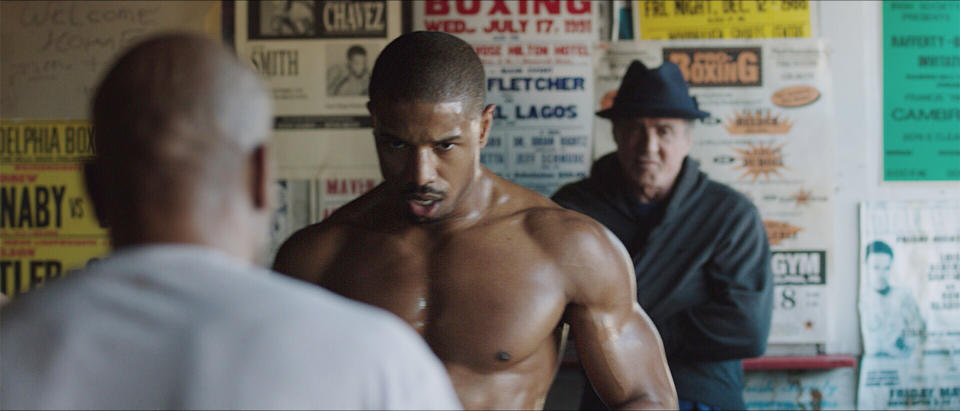
DEADLINE: What is the aftermath of a punch like that?
STALLONE: His neck was stiff, the next day. He said, “You do this all the time?” I said, “An occupational hazard, I’m sorry.”
DEADLINE: When you were on the receiving end of those punches, what was the hardest you got hit?
STALLONE: Carl Weathers really hit hard, and the gloves we were using were small. They said they were eight ounces, but they were more like six ounce gloves. I look at them today, and I go, “Oh my God, what was I thinking?” He cracked my rib, but luckily, that was at the end of the movie when we were doing body shots.
But the hardest I was ever hit was with Dolph Lundgren, who was immense and had been the World Kickboxing Champion. He was tall and had tremendous leverage. I told him, as I told Michael B. Jordan, “You know, we have to really focus on realism.” And he took it a little far. But I had just seen this real fight between Hagler and Hearns, which is just a classic all-out battle, and I thought, “God, why don’t we try to reenact that?” There’s no way you can choreograph that. You just have to go for it because it’s so frenzied that there’s no way you can just learn that punch pattern. It’s just impossible. I needed that kind of uninhibited violence which these two fighters had for each other. So I tell Dolph, “For the first 30 seconds, just come at me with everything you got, and I’ll just try to duck and dodge and do the best I can.”

DEADLINE: How did that work out?
STALLONE: Well, he comes at me, and he throws me into the corner. I’m battling back, and then bang, bang, bang, three times in the body, and I managed enough oxygen to say, “Cut.” Then, we proceeded for the rest of the day. It wasn’t until that night that my heart started to pound. I went to the hospital. My blood pressure was around 240, and next thing I know, I’m on a low altitude flight to Saint John’s Hospital where I was in Intensive Care for four days because the pericardial sac around my heart started to swell. He hit me so hard in the chest that the people at the hospital said, “Usually, this is the kind of injury you get from a head-on collision.” I said, “Well, it was pretty close to that.” They said, “It’s like a car accident.” I said, “Well, I think I was hit by a truck.” After that, I said, “Dolph, be careful, will you?”
DEADLINE: Be careful what you wish for?
STALLONE: I definitely got what I wished for, but then the insurance company shut us down. And the lawyers came over and investigated the film, and saw the actual impact, and understood. You know, you actually don’t feel it in the moment. I’m amazed at how these fighters do this, every day. I have the utmost respect for that.
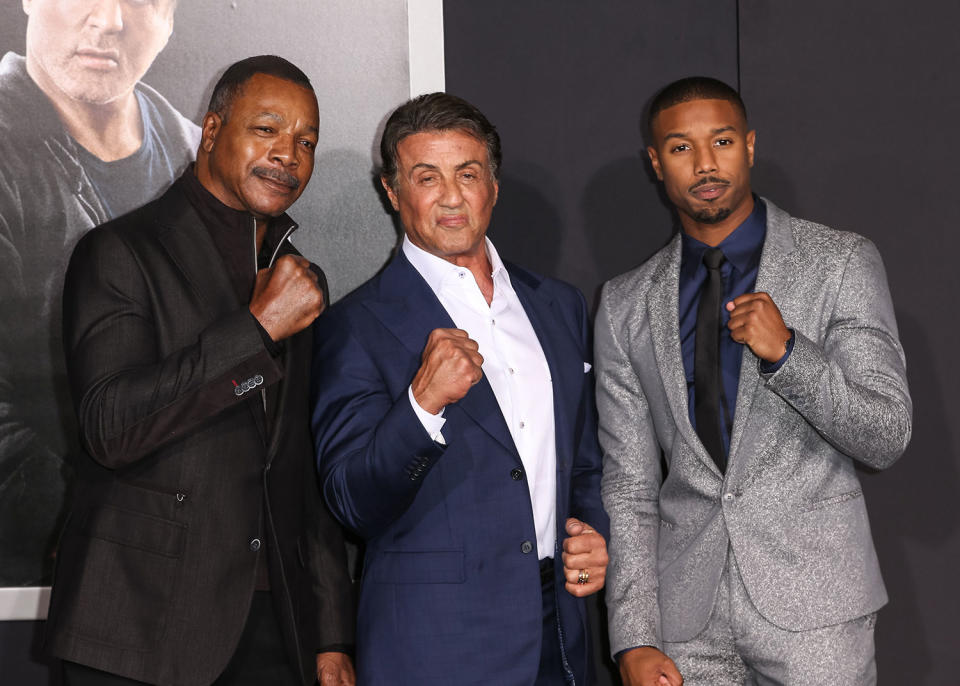
DEADLINE: Ryan Coogler told Deadline that Michael B Jordan was working out once a day, getting in solid shape, and then the director scouted boxing gyms in Philly. He was so amazed by the footwork and hand speed of those fighters that he challenged Michael B. to duplicate it. It took a year, Coogler said. How did the results compare to all the memorable ring battles from your past Rocky films?
STALLONE: It probably surpassed mine because we had lost the element of surprise; the audience is visually savvy and has seen all the fight films. What Michael had going for him is the same thing that Carl Weathers had. I was so blessed the day I met Carl, who is not just a fantastic actor, but a world class athlete who did things that normal actors and human beings can’t do. The fact that this is a movie called Creed, and it’s 40 years after Rocky, well it shows the impact that Carl Weathers had with Apollo Creed. I hadn’t seen that in the ring before. Dolph Lundgren was a good athlete besides being a Fulbright Scholar, and Mister T was a good athlete, but nothing quite like Carl.
And then along comes Michael Jordan, who has extraordinary athletic ability. He’s an amazing basketball player with a 40 inch vertical jump. He was able to morph his athleticism into boxing, which is a very, very, very slow process. He put in the time. I can’t tell you the pounding he took, because he was in there with professionals as opposed to other actors. And he wouldn’t give up. What happened is he’s from Newark, New Jersey, and I think it was his background starting coming back to him. I saw the California start to come out of him, and watched the East Coast Newark Main Street come back into him. He got that swagger and moves that fighters get. It is a calm athleticism, but you know in a second, it can turn into a graceful ballet of violence.
DEADLINE: Next year marks the 40th anniversary of Rocky. That Best Picture is all the more impressive when you consider it beat out Network, All the President’s Men, Taxi Driver, and Bound For Glory. You were up for Best Actor and Best Original Screenplay. Can you remember how you felt coming into that night? What chance did you think your little movie had?
STALLONE: I didn’t think it had much chance. The music, maybe, and I thought Burgess Meredith, for sure, but I wasn’t expecting anything else. Those other films were so good, I was just happy to have been invited. A year earlier, I was in a whole other different world. Then John won against so many Hall of Fame directors [Ingmar Bergman, Sidney Lumet, Alan J. Pakula, Lina Wertmuller, with Taxi Driver’s Martin Scorsese not even nominated] and I thought, “Wow. This is unbelievable.” Then the picture won, and it floored me then, and it floors me to this day.
DEADLINE: Who did you talk to, and who were you too intimidated to talk to?
STALLONE: Actually, the person I talked to first, was John Wayne. I didn’t know anybody so I was sort of in the corner, feeling very awkward. He walked over and said, “I’d like to introduce myself. My name is John Wayne.” I said, “I recognized you, slightly.” He was just so humble, and he goes, “Welcome to the industry. I saw your film, and you were very good.” That took away my breath, but I relaxed after that, thinking I was just going to sit back and enjoy the show. I only wish there were cell phones back then. I would have filmed it all and had more memories of that night.

DEADLINE: Everybody has a few elevated experiences in their lives. Can you describe your feeling when Jack Nicholson read the Best Picture nominees and then said, “Rocky,” this little script you wrote out of desperation to be in this business?
STALLONE: It’s hard to describe something that is so unexpected, so surreal. I imagine it would be like…you’ve been impoverished, and then all of a sudden, you win the lottery. You go, “What?” And this flood of adrenaline comes through your body, and you just literally in an altered state of just, what is the word I’m looking for… of such stunned realization that now this is real, really real and these people who to you are virtual strangers, they are all applauding you. I never felt more gratified, and it was a high point I’ve never felt since. It was just so unexpected, and I was so… what’s the word I’m looking for…just shockingly grateful. And I thought, isn’t this so amazing that this underdog movie did this? It was just a minor miracle; I’m telling, there were so many great films that year. Taxi Driver was unbelievable; that performance by Bob De Niro and Martin Scorsese, and the music. Anyway, you’ve put me back into that state of shock which is how I think of it now. As I get older, I realize how rare those extraordinary moments in life are. You couldn’t understand it back then and you wish you had the mentality you have now, so you could really have appreciated it.
DEADLINE: You’re 69 now, and you’re experiencing a version of that appreciation for your Creed performance. Is there some way you hope to be able to spend the currency of new found respect and momentum?
STALLONE: Oh yeah. What I really want to do is just … pay attention more to people when they present a project that is obviously challenging, and age appropriate, I’d like to explore that route. I’ve been very fortunate in action films, and that has been gratifying. But I have circumnavigated that world. I’d like to just explore something different, and work with other young directors like Ryan. I look at Clint Eastwood, who has really set the bar very high, and has set a great example of how you can act and direct and do quality work into the latter part of life. That is something that I will strive for.
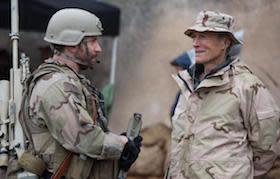
DEADLINE: You have been reflective here, and you are 69. What are the best and worst things about getting older?
STALLONE: Well, let’s see. The best thing about getting older is…nothing. There’s zero good in getting older.
DEADLINE: Wisdom and experience don’t cover the downside?
STALLONE: Yeah, I like that every day I forget something new. You do benefit from wisdom and I think your soul grows a little bit, and you become a bit more tolerant, and more forgiving. I remember my father, who was a very tough man, on his deathbed. His final words to me were, “Just learn to forgive. Just don’t be angry. Just learn to forgive.” I went, “Wow, okay.” So there is wisdom, and you understand that you should try to really enjoy the ride while it’s still spinning.
DEADLINE: And the worst part of getting older?
STALLONE: I think it’s the lower back. I know you were expecting something great and more philosophical.
DEADLINE: Actually, I’m 55 and just went back to the gym after travelling for three weeks, and somehow what you said just speaks so personally to me.
STALLONE: Really? Then I won’t even go any lower, like to the knees. I’ll leave it at the lower back.
Related stories
'Spotlight', Charlotte Rampling, Michael B. Jordan Top Winners For National Society Of Film Critics
Pete Hammond's Notes On The Season: No Holiday Break In The Uber-Competitive Race For Oscar
Sylvester Stallone Signs With Manager Rick Nicita
Get more from Deadline.com: Follow us on Twitter, Facebook, Newsletter

